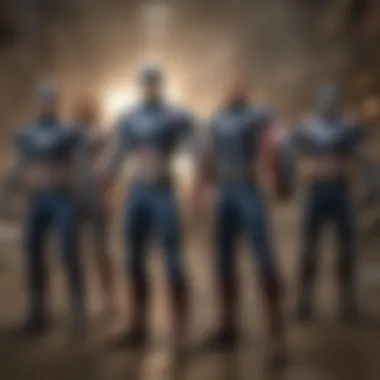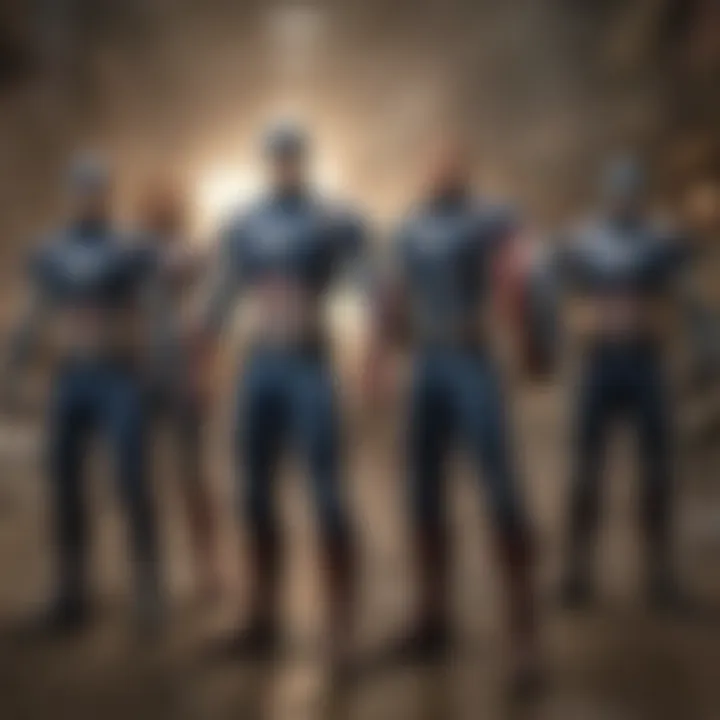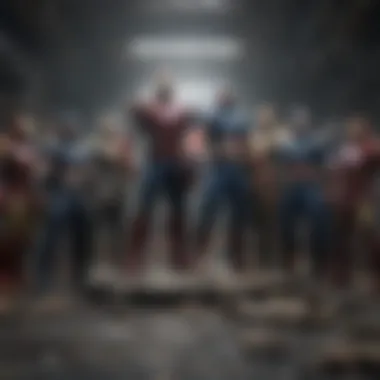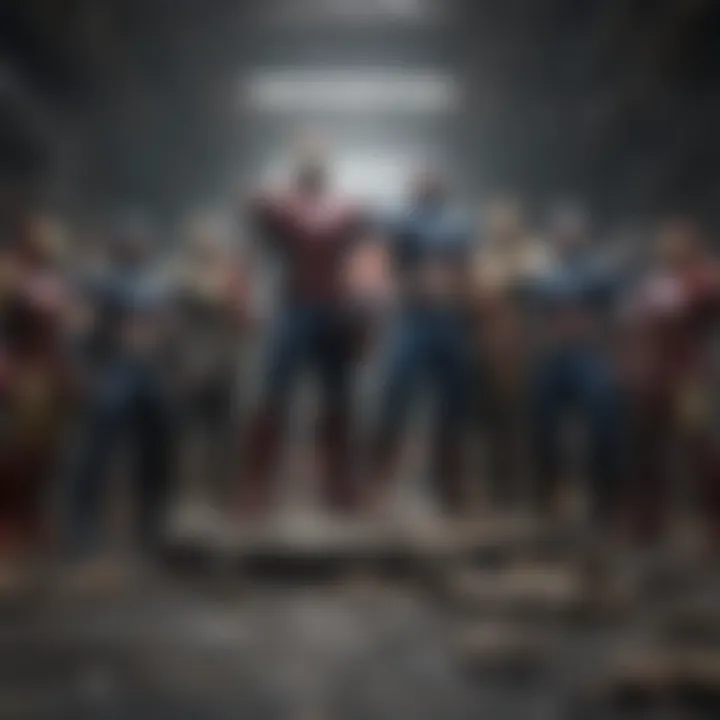The Ultimate Viewing Order for Marvel's Avengers Films


Intro
The Marvel Cinematic Universe (MCU) has morphed into an extraordinary cultural phenomenon since its inception. With dozens of films and characters weaving intricate narratives, it has become imperative for fans, both new and seasoned, to grasp the right viewing order, particularly for The Avengers series. This collection of films boasts a complicated timeline where seemingly standalone stories intertwine into a larger tapestry. So, prepare for a journey that not only guides you through the films but also adds layers of understanding to the characters and plots within this vast universe.
Overview of the Entertainment, TV Show, or Film discussed
In the world of cinema, The Avengers represent a pivotal moment in the MCU. Initially introduced in "Iron Man" back in 2008, it wasn't until 2012 that The Avengers film brought together a formidable team of superheroes. Directed by Joss Whedon, the film marked a turning point for not only superhero movies but also ensemble casts in Hollywood.
Background information about the entertainment piece or production being reviewed
The Avengers encompasses films that illustrate the might of individuals when they unite for a common purpose. Each movie not only provides entertainment but also explores deeper themes of friendship, sacrifice, and heroism. Within the narrative, characters like Tony Stark, Steve Rogers, and Natasha Romanoff face not only external threats but also their internal demons, showcasing growth throughout the series.
Brief synopsis of the plot or storyline
Though each film seemingly tells its own story, they all contribute to the greater arc of The Avengers. From the initial assembly of heroes in "The Avengers" to the cosmic conflicts in "Avengers: Infinity War" and the emotional resolution in "Avengers: Endgame," these films chart the evolution of each character, while threading together complex relationships and narratives that resonate long after the credits roll.
Key details about the creators, directors, actors, or showrunners
The mastermind behind these films includes directors like Joss Whedon for the first two Avengers films, and the Russo brothers who took the helm for the latter entries, bringing their unique vision to each installment. Iconic actors like Robert Downey Jr. as Iron Man, Chris Evans as Captain America, and Scarlett Johansson as Black Widow have not only portrayed superheroes but have also evolved into the heart and soul of the franchise.
Analysis and Critique
When dissecting The Avengers' films, one cannot overlook the impressive performances that elevate the material. The ensemble cast delivers strong portrayals, particularly in their emotional interactions with one another.
- Performance: Downey Jr. injects charm and wit into Iron Man, making him relatable, while Evans showcases Captain America’s unwavering morality.
- Direction: The Russo brothers effectively utilized pacing to build tension, ensuring the audience remained on the edge of their seats during climactic moments.
- Cinematography: The stunning visuals paired with dynamic fight choreography set a high standard for action sequences in cinema.
Comparing The Avengers films to earlier superhero movies, one can see a marked progression in storytelling and character development. These films do not merely rely on flashy battles; instead, they delve deep into moral dilemmas and personal struggles, giving the audience a chance to ponder the weight of heroism.
Identification of themes, tones, or stylistic choices
Recurring themes in The Avengers films include sacrifice, teamwork, and the exploration of identity. The tones can shift from lighthearted camaraderie to intense drama, creating a rich emotional spectrum that caters to diverse audience tastes.
"With great power, comes great responsibility." This line encapsulates the core message woven throughout the series—we see characters grapple with the consequences of their actions, reinforcing the real stakes involved.
Audience Reception and Ratings
The reception of The Avengers films has been overwhelmingly positive. Box office results speak volumes—the series has grossed billions worldwide, breaking records along the way.
- Critical acclaim: Films like "Avengers: Endgame" have received universally high scores from critics and fans alike on platforms like Rotten Tomatoes.
- Viewer ratings: Across platforms such as IMDb and Metacritic, audiences have shown love for the nuance in storytelling and character complexity.
- Box office performance: The franchise’s ability to draw audiences consistently over a decade demonstrates its lasting appeal.
Comparing ratings showcases a general consensus of effectiveness in fulfilling audience expectations, while also expanding the scope of superhero narratives.
Recommendations and Epilogue
For fans of comic book adaptations, starting with "Iron Man" before moving through the chronological course of events is essential. Casual viewers might appreciate focusing on the main Avengers films to grasp the core story arcs.
In summary, understanding the viewing order of The Avengers films within the MCU enriches the experience. Each installment not only serves as standalone entertainment but as chapters of an unfolding story that captures the essence of heroism. The tremendous effort put into addressing character arcs and overarching narratives solidifies the MCU's presence in contemporary cinema.
Preamble to the Marvel Cinematic Universe
The Marvel Cinematic Universe (MCU) has reshaped the landscape of modern cinema, becoming a cornerstone for superhero films and an expansive narrative tapestry. This universe weaves together stories, characters, and conflicts across a multitude of films and shows, giving fans a rich experience that transcends individual movies. Understanding the MCU, especially the Avengers narrative, allows enthusiasts to navigate its complexities and enjoy the interconnected adventures that unfold.
One of the most significant aspects of the MCU is its timeline and how various movies link together to form a cohesive whole. Each film not only stands on its own but also contributes to a larger story arc. This interconnectedness means that watching the Avengers films in a particular order can enhance the viewing experience. It helps to comprehend character developments, relationships, and overarching themes that are pivotal to the saga.
The Birth of the MCU
The inception of the MCU dates back to 2008 with the release of Iron Man. This film was more than just an introduction to Tony Stark; it marked the beginning of a new cinematic era, where characters would exist within a shared universe. Marvel Studios took a bold step by investing in a long-term vision, which was a gamble at that time. The establishment of its own studio paved the way for integration of various superheroes. Before Iron Man, superhero films were often standalone, lacking the intricate web of continuity we see today.
The narrative of Iron Man showcased Tony Stark’s transformation from a self-absorbed industrialist to a hero, laying the groundwork for future films. It also introduced us to Nick Fury, played by Samuel L. Jackson, who teased the formation of the Avengers initiative in a post-credit scene. This moment hinted at a larger storyline, setting a high bar for storytelling in the genre. Fans began to speculate, leading to excitement and anticipation for future projects that would build on this foundation.
A New Era of Superhero Films
As the MCU gained momentum, it ushered in an era where superhero films became cultural phenomena. The blend of humor, complex character arcs, and relatable themes made these movies more than mere spectacles. They resonated with audiences across different demographics, drawing in not just comic book enthusiasts but also casual viewers. This fusion of genres redefined what superhero movies could do, elevating them to the realm of critical and commercial success.


Key films, such as The Avengers, released in 2012, demonstrated the potential of ensemble storytelling in cinema. It broke box office records and showcased how well-known characters could share the screen while contributing to one cohesive plot. The excitement surrounding this blended universe encouraged other film studios to explore similar models, creating a ripple effect in the industry. The success of the MCU inspired filmmakers and companies to think bigger, crafting more intricate narratives in superhero and beyond.
"Marvel's approach was groundbreaking. They did not just create films; they created a world that felt populated by real people, with real stakes and emotions."
In summary, the birth of the MCU and the subsequent new era of superhero films represent a significant transformation in contemporary cinema. By understanding these foundations, audiences can fully appreciate the intricate magic that unfolds in the Avengers viewing order. Engaging with the MCU allows fans not only to witness thrilling action but to dive deep into a universe rich with complex characters and interwoven tales.
Understanding the Avengers Assemble
Grasping the dynamics behind the assembly of the Avengers team is crucial in understanding both the narrative arc and thematic depth of the Marvel Cinematic Universe (MCU). This section delves into the pivotal moments and character interactions that formulate the backbone of this legendary group. The Avengers are not just a band of superheroes; they represent a complex interplay of motives, backstories, and the pursuit of a common objective. Each character contributes not just superhuman abilities but an emotional and moral framework that enhances their collective strength. Understanding this formation allows viewers to appreciate how individual character journeys converge into a unified effort to face greater threats.
Formation of the Team
The formation of the Avengers is often viewed as a hallmark moment in cinematic history. The events leading up to the first Avengers movie set the stage through both drama and camaraderie, paving the way for a unique coalition of heroes. Iron Man, Thor, Hulk, Black Widow, and Captain America come together, each with contrasting ideals and approaches.
- Diverse Backgrounds: Each member stems from a different background. Tony Stark's tech-savvy mentality clashes with Steve Rogers' traditional heroism and moral integrity. Thor's royal demeanor creates a fascinating dynamic with Natasha Romanoff's stealthy intrigue.
- Mutual Trust Issues: Initially, trust among them is a fragile concept. There’s tension, especially in The Avengers film, where they are often at each other's throats. Nick Fury uses this tension to catalyze their growth into a cohesive unit, forcing them to confront their differences.
- Common Threats: It is only in the face of a unified threat that they see the importance of banding together. Loki's ambition not only serves as an enemy but a mirror reflecting their personal struggles. The necessity to defeat a greater evil acts as an icebreaker, solidifying their roles as heroes who can put aside differences for a common goal.
The Role of Nick Fury
Nick Fury stands as the architect behind the Avengers team's creation. More than just a leader, he is a figure that embodies resolve and perspicacity, illustrating the complexities of leadership in a world where everyone possesses unique strengths and weaknesses.
- Visionary Leadership: Fury sees potential where others might not. He recognizes each character's value and manipulates situations to create opportunities for collaboration. His strategic foresight stems from a deep understanding of these heroes' capabilities, as well as recognizing their vulnerabilities.
- Conflict Management: Balancing egos is a Herculean task. Fury is adept at navigating the occasional storms that the team's personalities create. His approach often includes deploying psychological tactics that promote introspection among the heroes, urging them to reflect on their motivations and attitudes.
- Sacrificial Decisions: He is not afraid to make hard choices for the greater good. Fury's decisions sometimes come at a high moral cost, revealing the burden of leadership. He continuously walks the tightrope between national safety and hero autonomy, showcasing how tough decisions often arise in leadership roles.
Ending on a note of reflection, the gathering of the Avengers isn’t merely a historic moment in film. It’s a narrative filled with rich character exploration and a testament to the importance of teamwork in overcoming adversities. Understanding the precise elements of their assembly enriches one's viewing experience and appreciation of this legendary franchise.
Chronological Viewing Order of Avengers Films
The series of films that comprise the Avengers storyline within the Marvel Cinematic Universe (MCU) not only form an extensive narrative tapestry, but they also present significant character arcs that resonate deeply with audiences. Understanding the chronological viewing order helps viewers appreciate the development of characters and the intricacies of the plots that span across different films. By diving into this order, you can grasp how events unfold and how they connect to create a unified saga. It’s not just about watching a set of superhero movies; it’s about experiencing a journey where every film contributes to the greater narrative.
Iron Man and Its Significance
Starting with Iron Man, this film serves as the cornerstone of the MCU. Released in 2008, it not only introduced audiences to Tony Stark, a billionaire genius, but it also kicked off the interconnected storytelling that would come to define the universe. The significance of this film lies in its revolutionary approach to superhero storytelling. It established the tone, style, and even the humor that would later be weaved throughout the Avengers films.
Iron Man redefined the hero’s journey with Stark's transformation from a self-absorbed industrialist to a selfless hero. This evolution sets the stage for the emotional depth and dramatic stakes seen in later Avengers films. One cannot overlook how it concluded with the iconic line, "I am Iron Man," leaving audiences buzzing about future possibilities.
The Incursion of Thor
Next in line, Thor introduces us to the cosmic elements of the MCU. Cultures collide as Norse mythology enters the conversation. This film’s importance cannot be overstated, as it brings a compelling character, Thor, who has far-reaching implications for the Avengers narrative.
In Thor, viewers get an insight into the dynamics of family, especially the complicated relationships between Thor, Loki, and Odin. These familial ties resonate throughout the subsequent films, showing how personal stories deeply intertwine with larger conflicts. Thor’s transition from a warrior seeking glory to a hero understanding the weight of responsibility is crucial. It not only adds complexity to his character but also prepares him for the challenges ahead.
Captain America: The First Avenger as a Foundation
Moving on, Captain America: The First Avenger is a vital part of this chronological viewing order. This film sets up the roots of Avengers with Steve Rogers, a man who embodies the essence of courage and sacrifice. The timeline of the MCU is enriched by Captain America's story, which begins during World War II and introduces us to Hydra, the Red Skull, and the concept of a super-soldier.
The struggles and moral dilemmas faced by Captain America give audiences a foundational understanding of what it means to be a hero. This film also includes the Tesseract, an artifact that will play a pivotal role in the Avengers saga. The themes of freedom, sacrifice, and loyalty become significant anchors as we witness how they echo throughout the Avengers series.
Beyond mere entertainment, these films encourage reflection on heroism, community, and the qualities that define a true hero.
By viewing these films in chronological order, the importance of each character and their choices becomes strikingly clear. Each story layer enriches the overall experience, preparing the viewer for the epic team-ups and showdowns that are to follow. Understanding these beginnings allows a profound appreciation of the character growth and arcs that ultimately lead to the formation of the Avengers.
The Avengers Movies in Sequence
The sequence of the Avengers movies plays a pivotal role in understanding the underlying threads that weave the Marvel Cinematic Universe together. Each film acts as a stepping stone, not just for the characters but also for the narrative arcs that enfold them. When viewed in sequence, these films provide viewers with a beautifully layered tapestry of interconnected stories, emotional evolutions, and significant themes that resonate throughout the franchise.
By examining the movies in chronological order, fans can appreciate character growth more fully. Developments happen subtly between films, and nuances in relationships and motivations gain more clarity. This approach glorifies not only the dramatic moments but also the quiet, reflective times that often get overshadowed in a single screening.
Furthermore, this sequential viewing enhances the enjoyment of advocacy—for instance, having a keen eye on how alliances shift and evolve across films. Viewers witness characters meet triumphs, experience losses, and navigate shifting allegiances. This fulfillment of story arcs culminates in a broad understanding of how these films are much more than mere spectacles; they are rich narratives that speak to unity, sacrifice, and the complexity of human (and superhuman) relationships.
The Avengers and Its Cultural Impact
The release of The Avengers in 2012 marked a memorable juncture in cinema history. It was not only the successful culmination of multiple narrative threads from earlier superhero films but also an audacious testament to what could be achieved in the realm of a shared cinematic space. The cultural impact was immediate; the film set box office records, inspiring a tsunami of superhero films to follow.
The harmony of so many iconic characters sharing the screen was unprecedented, prompting audiences to engage in discussions around potential matchups, abilities, and allegiances. The film essentially transitioned comic book lore from niche fandom to mainstream phenomena, paving the way for a surge of merchandise, fan conventions, and an entire subculture revolving around superhero narratives.


"The Avengers demonstrated that ensemble casts could thrive in a blockbuster setting, reshaping audience expectations and raising the bar for future films."
Age of Ultron: Expanding the Universe
Avengers: Age of Ultron, released in 2015, took the groundwork laid by its predecessor and explored deeper themes while expanding the universe in intriguing ways. The film introduces Ultron, a complex villain with philosophical inquiries regarding humanity and technological advancement.
Throughout the movie, viewers notice a darker tone compared to the original. The underlying goal is to present not merely epic fight sequences, but rather, the moral dilemmas heroes face while being tasked with the duty of safeguarding Earth. Here, audiences see how power can corrupt, illustrated powerfully through the character of Ultron and the unintended consequences of Tony Stark’s actions.
The addition of new characters, such as Scarlet Witch and Vision, also stirs the pot. They are not just additional faces; their introductions shape the core of the Avengers' dynamics significantly, influencing future interactions.
Infinity War: A Turning Point
Avengers: Infinity War, released in 2018, serves as a monumental pivot in the MCU saga. The film assembled almost every existing character, creating an expansive tapestry of alliances that stretched across galaxies. The stakes have never been higher, as Thanos, an antagonist shrouded in perplexity, embarks on a quest to acquire the Infinity Stones
Infinity War delivers a jarring jolt to fans, being a film that embodies loss on an unprecedented scale. It does not shy away from mature themes, showcasing not just battles but emotional devastation, which ripples throughout the narrative arc of following films. The character development is palpable; heroes faced with dilemmas of choice and consequence leave audiences both frustrated and enlightened about the complexities of moral choices.
Endgame: The Culmination of a Saga
The emotional crescendo of the MCU comes with Avengers: Endgame. Released in 2019, it brings together loose ends and provides a conclusion to ongoing quests. The film is a reflection on time, loss, and the need for redemption. It dives deep into character psyches, showcasing how they have been affected by the events of Infinity War.
In Endgame, every choice made by the heroes becomes integral. The narrative cleverly plays with themes of legacy and the iterations of choices in the context of character development, which aids in delivering a heart-wrenching yet triumphant conclusion. Throughout the film, viewers witness the compelling arc of sacrifice and the worth of community as the heroes come together once more to undo the catastrophic actions of Thanos.
This moment not only celebrates the journey viewers have taken through the MCU but also reaffirms the sense of belonging among the characters, allowing fans to feel a sense of completion and satisfaction. In essence, Endgame doesn't just conclude a trilogy but encapsulates a saga that has been years in the making.
Significance of Side Stories and Spin-offs
The world of the Marvel Cinematic Universe is vast and intricate; it extends far beyond the main Avengers films. Side stories and spin-offs are important threads in the large tapestry of the MCU, allowing for deeper character exploration and richer narratives. While the Avengers movies tell the stories of these iconic heroes, side stories serve as crucial background fillings that enhance the viewers' understanding of the main plot.
Understanding the Role of Side Characters
When people think of the Marvel universe, they often picture the Avengers—Iron Man, Captain America, Thor, and the rest of the gang. However, the side characters play a vital role in the overall arc of the franchise. These characters often have rich histories and complex motivations that are explored more in standalone films or television series. For example, characters like Scarlet Witch and Hawkeye, while not always in the forefront, significantly impact the Avengers’ journeys.
- Depth: By exploring side characters, fans get a fuller picture. Wanda Maximoff's transformation in WandaVision reveals not just her powers but her emotional struggles, making her a more relatable hero.
- Connections: Side tales create seamless links between the films. Fans might not realize that the emotional weight of Avengers: Endgame is heavily influenced by what transpired in Black Widow.
- Narrative Arcs: These characters' stories often set the stage for major events in the Avengers films. Ant-Man in Ant-Man and The Wasp is just one example where seemingly small narratives set up crucial plot points for Avengers: Infinity War.
The Impact of Television Shows
Television shows within the MCU have emerged as significant components, further bridging the gaps between films. They don't merely act as fillers but contribute essential elements to the larger narrative. Viewing these shows can enhance the film experience and provide backstory and context that might be glossed over.
- Expanded Universe: Shows like Loki and What If? introduce alternate timelines and realities, making stakes in the films feel profound and layered.
- Character Development: Characters often get more screen time in series than in films. For instance, Falcon and the Winter Soldier has allowed fans to see a nuanced exploration of Sam Wilson's and Bucky Barnes' struggles, unresolved conflicts, and evolving dynamics.
- Direct Tie-ins: Many television narratives directly tie into upcoming films. It's crucial for fans who want to stay ahead in the storyline to watch these shows, as they frequently serve as setup for what is to come in the cinematic releases.
"The MCU’s side stories and television shows are like the icing on a cake; they add sweetness and complexity to the main story."
By understanding the significance of these narratives, viewers gain a deeper appreciation for the intricate storytelling woven throughout the MCU. Both side stories and related television shows not only fill in the gaps but also enrich the primary narrative, enhancing the overall viewer experience.
Thematic Elements in Avengers Films
The Avengers films encapsulate a rich tapestry of themes that resonate deeply with audiences across the globe. These themes elevate the viewing experience from mere entertainment to profound storytelling, offering insights into human nature and societal values. Key thematic elements observed throughout the films include sacrifice, redemption, friendship, unity, and the struggle between good and evil. Each thematic strand contributes to the narrative, intertwining character development with overarching story arcs. By examining these themes, viewers gain a deeper appreciation for the Marvel Cinematic Universe (MCU) and its complex storytelling.
Themes of Sacrifice and Redemption
Sacrifice is a recurring theme that echoes strongly within the Avengers narrative. Characters are often faced with dilemmas that challenge their moral compass and force them to weigh personal desires against the greater good. Notable examples include Iron Man's self-sacrifice in Avengers: Endgame, where he puts everything on the line to defeat Thanos and save the universe. Such acts are not mere fantasy; they mirror real-world situations, stirring emotions and compelling viewers to contemplate the weight of their own choices and the sacrifices they might make for loved ones or ideals.
Moreover, redemption arcs—like that of Black Widow—add layers to character complexity. Her journey from a covert assassin to a selfless hero represents the struggle of overcoming a checkered past to forge a worthy future. This fascination with redemption resonates with many, serving as a reminder that it’s never too late to change one's path.
Friendship and Unity Among Heroes
The theme of friendship and unity is woven into the very fabric of the Avengers. The core is the camaraderie among heroes, showcasing how bonds can be formed amidst the chaos of battle. This unity is highlighted in pivotal moments throughout the films, particularly in the way characters rely on each other during high-stakes situations.
For instance:
- The Avengers must set aside their differences to create a unified front against Loki in the first film.
- The connection between Captain America and Iron Man evolves from rivalry to mutual respect, illustrating that differing beliefs can coexist with friendship.
- Thor and Rocket Raccoon, unlikely allies, demonstrate how diverse backgrounds can unite for a common cause.
These friendships extend beyond just the battles they face. They remind audiences that collaboration, understanding, and support strengthen individuals—qualities that are even more vital in today's fragmented world.


"The true test of heroes lies not only in their powers but also in their ability to stand together against adversity.”
Comparative Analysis of the Avengers Films
The Avengers films not only represent the pinnacle of superhero storytelling but also illuminate a broader cultural phenomenon. Each installment brings something distinct to the table, whether it be innovative visual techniques or deepening character arcs. This comparative analysis aims to dissect these elements, highlighting what makes each movie unique while acknowledging their interconnectedness.
Visual and Narrative Styles
The visual styles of The Avengers, Age of Ultron, Infinity War, and Endgame vary significantly, reflecting the evolution of both technology and storytelling within the Marvel Cinematic Universe.
- The Avengers, directed by Joss Whedon, introduces audiences to a vibrant palette filled with colors that emphasize each character's essence. The cinematography focuses on team dynamics, with sweeping shots that capture the significance of teamwork.
- Age of Ultron shifts slightly, intertwining darker visual tones that parallel the psychological struggles faced by each hero. The narrative leans into character backstories more than its predecessor, blending lighthearted moments with serious undertones.
- When we move to Infinity War, the tone is heavier, underlined by stark lighting and a visual style that mirrors the chaos of the conflict. The film’s narrative is also more complicated, with numerous storylines running concurrently, which ultimately demands that viewers pay close attention to follow the threads connecting all the characters.
- Endgame, on the other hand, balances nostalgia and resolution. The visuals echo the emotional weight of the characters’ journeys, where darker moments transition to brighter tones during pivotal scenes of hope, particularly in the climactic battles that celebrate the heroes’ unity.
In essence, the visual representation of these films does not merely serve the aesthetics; it reinforces the narrative threads that tie the characters’ arcs together, inviting audiences to feel their triumphs and losses profoundly.
Character Development Across Films
Character development is a cornerstone of the Avengers series, and each film contributes layers to familiar personalities.
- In The Avengers, we are introduced to a ragtag group that learns to work together. Characters like Thor and Iron Man initially clash but ultimately discover common ground, signaling growth that extends beyond individual conflicts to communal strength.
- Age of Ultron probes deeper into the psyches of characters, exploring themes of fear and responsibility. The introduction of new characters like Scarlet Witch adds new dimensions, as there are dynamics of trust and betrayal woven throughout.
- Infinity War takes character development up a notch, as it presents heroes grappling with their shortcomings. The desperate measures taken by different characters showcase their complexities. For instance, Doctor Strange’s choices reveal a tension between self-preservation and the greater good.
- Finally, Endgame serves as a culmination of this growth. Characters like Tony Stark face their past, culminating in a poignant realization of their legacy’s impact. Meanwhile, Captain America’s journey concludes with themes of sacrifice and moral duty, embodying a full-circle moment that resonates with fans.
"Character growth is not just about change; it's about the journey and how it reflects the paths we all tread in our own lives."
In summary, analyzing these visual and narrative styles, along with character development, enhances our understanding of the Avengers films. It shows us how these movies work as a cohesive whole, each building on the last, offering audiences not just entertainment, but a rich tapestry of storytelling that engages both the mind and the heart.
Fan Reception and Legacy of the Avengers
The Avengers films are not just movies; they transcend mere entertainment and have established themselves as a pivotal part of modern cinematic history. Their reception among fans has influenced countless aspects of filmmaking and storytelling within the superhero genre. The legacy of these films is multi-faceted, stemming from their box office triumphs and the fervent engagement of their fan base. Let’s unpack these elements to truly understand the significance they hold within the Marvel Cinematic Universe.
Box Office Success and Critical Reception
When it comes to box office performance, the Avengers series is a heavyweight. Starting with the 2012 release of The Avengers, the film became the first superhero film to gross over $1 billion worldwide. It paved the way for subsequent entries like Avengers: Infinity War and Avengers: Endgame, the latter of which shattered records by becoming the highest-grossing film of all time for a period.
The films were not just commercial successes; they also garnered significant critical acclaim. Critics appreciated the blend of humor, action, and complex character interactions. For instance, Avengers: Endgame received praise for its emotional depth and closure, wrapping up a decade-long saga in a way that resonated with audiences. The interwoven narratives and character arcs highlight a rich tapestry that invites discussions, theories, and online fandom.
However, reception has not always been stellar. Avengers: Age of Ultron, despite its box office success, faced criticism for its narrative coherence and heavy reliance on setup for future films. This juxtaposition of critical reviews showcases how the expectations of fans can both elevate and challenge filmmakers.
"The legacy of the Avengers is not merely rooted in financial achievement but in its cultural influence and the fandom it has cultivated."
The Impact on Future Superhero Movies
The Avengers franchise has indeed set a benchmark for superhero films worldwide. Its collaborative approach with interconnected stories has led to a new era of cinematic universes, influencing not just Marvel but also other studios. Films like Justice League and various X-Men titles have attempted to replicate this shared universe model, hoping to tap into the undeniable success of Marvel's blueprint.
Moreover, the emphasis on character development and cohesive storytelling has shaped audience expectations. Today's viewers crave more than just special effects; they desire authenticity and relatability in characters. This shift has made filmmakers aware that strong, intricate narratives are essential for success.
In essence, the impact of the Avengers cannot be overstated. They’ve carved a niche in pop culture, turning ordinary fans into engaged enthusiasts who will discuss plot points, share fan art, and attend conventions. This level of engagement not only bolsters the legacy of the Avengers but also enhances the overall popularity of the superhero genre.
Epilogue: The Enduring Appeal of the MCU
The Marvel Cinematic Universe has firmly established itself as a cornerstone of modern cinema, with the Avengers saga at its core. This conclusion serves to reflect on the elements that contribute to the enduring allure of this universe. It encapsulates not only the cinematic impact of these films but also their cultural footprint. These films have crafted a vast tapestry of interconnected stories that resonate with audiences across generations.
Lessons from the Avengers Journey
Through its rich storytelling, the Avengers franchise offers valuable life lessons. The narratives often highlight themes of heroism, resilience, and the importance of camaraderie. The audience watches as characters navigate their own flaws and struggles, ultimately emerging stronger—together. This collective journey mirrors many of our own personal experiences.
For instance, characters such as Tony Stark and Steve Rogers exhibit unique growth arcs, evolving from self-centered individuals to selfless heroes ready to sacrifice for the greater good. The complex relationships among the Avengers emphasize that strength does not only come from superpowers but also from vulnerability and understanding. These lessons resonate deeply with viewers, encouraging them to reflect on their own lives, relationships, and responsibilities.
"In the end, we're all human, and that’s the beauty of it. It’s the imperfections that make us relatable."
Ultimately, the Avengers' journey teaches us that teamwork, loyalty, and sacrifice are paramount—not just in times of crisis, but in everyday life as well.
The Future of the Marvel Cinematic Universe
As we look to what lies ahead for the MCU, it is clear that the studio is dedicated to evolving its narratives while maintaining the foundational elements that fans cherish. The introduction of new characters, like Ms. Marvel and the multiverse dynamics introduced in recent films and shows, signals that the potential for storytelling is virtually limitless. Furthermore, platforms like Disney+ are broadening the scope, allowing for deeper storytelling and character exploration in series.
Fans are also buzzing about the future direction of iconic characters, especially given the recent developments surrounding legacy and mentorship themes. The core Avengers may have concluded their main arc, but their legacies will undoubtedly continue to influence the new heroes that rise to take their place. Marvel's storytelling has continuously adapted, incorporating social issues, complex villains, and moral ambiguities that reflect the changing world.
In short, the combination of engaging characters, intricate plots, and timely themes ensures that the MCU will remain relevant for years to come. The Avengers franchise may have reached its climax, but the universe's ongoing evolution guarantees that audiences will remain captivated by its exploration of heroism in all its forms.
As we hold our breath for future revelations and upcoming films, it's clear: the MCU is more than just entertainment; it is a communal experience that invites us to ponder and participate in the heroic journey.







